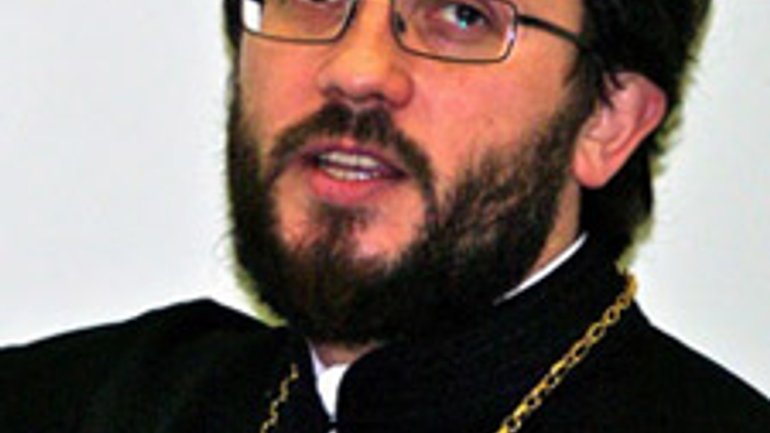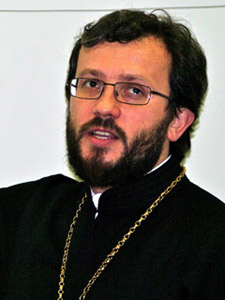“First of all, a balanced position concerning the question about the primacy in the church must be accepted.”

 The Holy Synod of the Russian Orthodox Church (ROC) at its session in the Kyiv Cave Monastery on July 26, 2010, decided to send the official delegation of the ROC to the session of the Joint International Commission for the Theological Dialogue Between the Orthodox Church and the Roman Catholic Church in Vienna (September 20-27, 2010). Archimandrite Kirill (Hovorun), deputy chair of the Education Committee of the ROC, is part of the delegation. RISU asked him to comment on the issues that will be raised at the meeting and the ROC’s position on them.
The Holy Synod of the Russian Orthodox Church (ROC) at its session in the Kyiv Cave Monastery on July 26, 2010, decided to send the official delegation of the ROC to the session of the Joint International Commission for the Theological Dialogue Between the Orthodox Church and the Roman Catholic Church in Vienna (September 20-27, 2010). Archimandrite Kirill (Hovorun), deputy chair of the Education Committee of the ROC, is part of the delegation. RISU asked him to comment on the issues that will be raised at the meeting and the ROC’s position on them.
— What are the most important issues that will be raised at the meeting?
— The “Krytskyj” Document will be reviewed. The ROC, by the way, did not participate in the preparation of the document. We will substantially examine the position of this document, which greatly differs from Orthodox ecclesiology.
— What is the position of the ROC regarding these meetings?
— First of all, a balanced position concerning the question about the primacy in the church must be accepted. We must begin with work on reaching an inter-Orthodox consensus on this question. This task will not be easy for there is not a positive teaching about primacy in the Orthodox.
— What are the different Orthodox stances on the primacy of the pope?
— The differences concern not so much the primacy of the pontiff, as much as the primacy within the Orthodox Church. On the one hand, the primate is an integral part of the church tradition. All recognize that primacy should be and function in the Orthodox Church. On the other, it is not understand how it should be. And this is why there are arguments. The Orthodox all have the same attitude toward the Roman primacy: primacy in the Orthodox understanding cannot be the same as the primacy of the Roman one.
— And what is the position of the Orthodox tradition on the primacy?
— Let’s put it this way, among the Orthodox theologians there are currently two (at least) positions on primacy in the Orthodox tradition. According to the first position, primacy exists nominally: there is only the first in honor, who other than the honorary primacy does not fulfill any other functions in Ecumenical Orthodoxy. All autocephalous churches are absolutely sovereign, in the sense of sovereignty of national states. Thus, any attempts to practically embody the honorary primacy in the field of inter-Orthodox relations are perceived as interventions in the internal affairs of the national church – similar to the interference in the internal affairs of a state. In my opinion, such an attitude toward primacy is inspired by the modern model of a sovereign state that appeared after the French Revolution.
The other position comes from the fact that primacy in the Orthodox tradition was always something real that had specific mechanisms of practical application. Another matter is that in history there was a very wide spectrum of mechanisms to realize primacy. Some of these mechanisms would have not been accepted now, like, for example, the interference of Saint John Chrysostom in the internal affairs of the Asiiski eparchies. Therefore there is no consensus between the supporters of this position regarding what specific power the primate can have in the current situation. They agree, however, that the “Federation” model of national churches, which excludes the possibility of a real primacy, is not traditional or acceptable.
It would be an exaggeration to say that the Russian Orthodox Church supports the first position in contradiction to Constantinople, which holds the second position. The ROC has theologians that are sure that primacy in the church should be filled with real content. By the way, such a position is held by Fr. Valentyn Asmus, who will also take part in the discussions in Vienna. I would also include myself in this group. I want to stress once more that we are talking not about the primacy of the pontiff, but about primacy in the Orthodox environment. All groups of Orthodox theologians agree that primacy in the Orthodox sense substantially differs from the primacy of the pope and how it is formed, in particular, at the First Vatican Council.
— After the negotiations between the Catholic and Orthodox churches began, a conflict arose between the delegations of the Constantinople and Moscow patriarchates over the question of the participation of the delegation of the Estonian Orthodox Church of the Constantinople Patriarchate. Have relations between the two patriarchates improved since Patriarch Bartholomew’s recent visit to Moscow, and will they affect the negotiations with the Catholics?
— Earlier in Chambesy, at the inter-Orthodox council, it was agreed that autonomous churches can only take part in general Orthodox events by sending delegates as part of the delegations of their kyriarchal churches. Thus the question on whether the Estonian Church of the Constantinople Patriarchate can participate was resolved. Now we can talk about the harmonization of relations between the Moscow and Constantinople patriarchates, and I believe this is very important for all of the Ecumenical Orthodoxy. It is also important for inter-Christian dialogues, including the one with the Roman Catholic Church. I hope that we will find an agreement in the Orthodox understanding of primacy in the church.
— Are other disputable issues, for example, about Filioque going to be reviewed?
— No, this question will not be examined. The discussion will focus on the text, dedicated to the role of the Roman Pope in the first millennium of Christianity.
— Do you know what the next question to be examined by the commission is? In your opinion, how long can these negotiations last?
— As far as I understand, after the first millennium we have to go to the second, that is examine the role of the Roman Bishop in that period, when this role caused a division in the Ecumenical church. This question is much more complicated than the one we are discussing now. Thus, I will not predict how long the negotiations will last or if they will be successful.
— What do you think of the unofficial format of discussion between Catholics and Orthodox where scholars, theologians, and interested people of different denominations discuss questions of primacy, other disputable questions, in order to better understand one another and with the goal of finding a consensus. Is there any benefit in such discussions for the overall church affair?
— I think very highly of alternative forms of the dialogue, especially those that are not between church functionaries but between scholars. An example of such a dialogue is the group in honor of St. Irenei Lionskyi, which unites Orthodox and Catholic scholars. The last meeting of this international group, by the way, was held last year in the Kyiv Cave Monastery. We discussed the historical context of the First Vatican Council and made substantial headway in understanding this question. I’m not sure this would have been possible from the dialogue at the official level.
— Thank you for the interview!
Interviewed by Taras Antoshevskyy
Lviv-Kyiv, August 12, 2010









